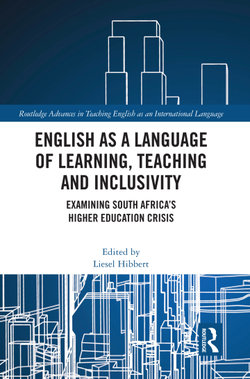
-
Books
-
Education
-
eBooks
-
Audio Books
-
Film & TV
-
Calendars, Diaries & Stationery
-
Giftshop

Hibbert explores South Africa’s higher education crisis utilising case studies and first-hand experiences with English as the language of instruction. The historical overview provides a framework with which to understand the complicated nature of using English as a language of instruction in South… more
Hibbert explores South Africa’s higher education crisis utilising case studies and first-hand experiences with English as the language of instruction. The historical overview provides a framework with which to understand the complicated nature of using English as a language of instruction in South Africa, past and present. Student narratives are presented to illustrate mainly breakthroughs, but also challenges.
An overview is provided, of imported English teaching methodologies and how they have emerged and developed in the local educational system over decades. It is demonstrated how these methodologies relate to socio-economic and political events and trends at each juncture. By applying defamiliarisation as a research method of investigation, students’ translanguaging struggles are recorded and discussed, both pre-pandemic and in the pandemic period. The experiences of non-monolingual English-speaking staff and students, and of local English/African language bilinguals is foregrounded, as they are by far the majority in South African higher education and schools. The relevance of the experiences and learning paths of those staff and students is enhanced.
This book aids lecturers across disciplines and English language facilitators in the improvement of English acquisition curricula through exposure to arguments, case studies and learning path narratives in this volume, and prompts and inspires researchers to develop further theories and experiments in their own context.
lessThis item is delivered digitally
Thanks for reviewing English as a Language of Learning. We will process your review. Accepted reviews will be posted within 3-7 business days.
Be the first to know, stay up to date with what's trending and get staff picks in your inbox with our newsletter


Public: Allow anyone to view or shop your List
Private: No one can view or shop your List
We have kept your A&R details for your new Angus & Robertson account
We also noticed that you have previously shopped at Bookworld. Would you like us to keep your Bookworld order history?
We also noticed that you have an account on Bookworld. Would you like us to keep your Bookworld details, including delivery addresses, order history and citizenship information?
Share This eBook